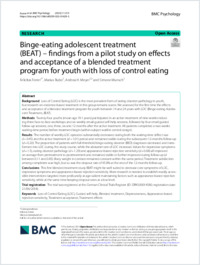Binge-eating adolescent treatment (BEAT) – findings from a pilot study on effects and acceptance of a blended treatment program for youth with loss of control eating
PSPE
- Forrer, Felicitas ORCID Department of Psychology, Clinical Psychology and Psychotherapy, University of Fribourg, Switzerland
- Rubo, Marius Department of Psychology, Cognitive Psychology, Perception and Research Methods, University of Bern, Switzerland
- Meyer, Andrea H. Department of Psychology, Clinical Psychology and Psychotherapy, University of Fribourg, Switzerland. Department of Psychology, Division of Clinical Psychology and Epidemiology, University of Basel, Switzerland
- Munsch, Simone Department of Psychology, Clinical Psychology and Psychotherapy, University of Fribourg, Switzerland
- 2023
Published in:
- BMC Psychology. - Springer Science and Business Media LLC. - 2023, vol. 11, no. 415, p. 1-19
Loss of Control Eating (LOC)
Guided self-help
Blended treatment
Depressiveness
Appearance-based rejection sensitivity
Treatment acceptance
Treatment effects
English
Background: Loss of Control Eating (LOC) is the most prevalent form of eating disorder pathology in youth, but research on evidence-based treatment in this group remains scarce. We assessed for the first time the effects and acceptance of a blended treatment program for youth between 14 and 24 years with LOC (Binge-eating Adoles- cent Treatment, BEAT).
Methods: Twenty-four youths (mean age 19.1 years) participated in an active treatment of nine-weeks includ- ing three face-to-face workshops and six weekly email-guided self-help sessions, followed by four email guided follow-up sessions, one, three, six and 12 months after the active treatment. All patients completed a two-weeks waiting-time period before treatment begin (within-subject waitlist control design).
Results: The number of weekly LOC episodes substantially decreased during both the waiting-time (effect size d = 0.45) and the active treatment (d = 1.01) period and remained stable during the subsequent 12-months follow-up (d = 0.20). The proportion of patients with full-threshold binge-eating disorder (BED) diagnoses decreased and trans- formed into LOC during the study course, while the abstainer rate of LOC increased. Values for depressive symptoms (d = 1.5), eating disorder pathology (d = 1.29) and appearance-based rejection sensitivity (d = 0.68) all improved
on average from pretreatment to posttreatment and remained stable or further improved during follow-up (d between 0.11 and 0.85). Body weight in contrast remained constant within the same period. Treatment satisfaction among completers was high, but so was the dropout rate of 45.8% at the end of the 12-months follow-up.
Conclusions: This first blended treatment study BEAT might be well suited to decrease core symptoms of LOC, depressive symptoms and appearance-based rejection sensitivity. More research is needed to establish readily acces- sible interventions targeted more profoundly at age-salient maintaining factors such as appearance-based rejection sensitivity, while at the same time keeping dropout rates at a low level.
Trial registration: The trial was registered at the German Clinical Trials Register (ID: DRKS00014580; registration date: 21/06/2018).
Methods: Twenty-four youths (mean age 19.1 years) participated in an active treatment of nine-weeks includ- ing three face-to-face workshops and six weekly email-guided self-help sessions, followed by four email guided follow-up sessions, one, three, six and 12 months after the active treatment. All patients completed a two-weeks waiting-time period before treatment begin (within-subject waitlist control design).
Results: The number of weekly LOC episodes substantially decreased during both the waiting-time (effect size d = 0.45) and the active treatment (d = 1.01) period and remained stable during the subsequent 12-months follow-up (d = 0.20). The proportion of patients with full-threshold binge-eating disorder (BED) diagnoses decreased and trans- formed into LOC during the study course, while the abstainer rate of LOC increased. Values for depressive symptoms (d = 1.5), eating disorder pathology (d = 1.29) and appearance-based rejection sensitivity (d = 0.68) all improved
on average from pretreatment to posttreatment and remained stable or further improved during follow-up (d between 0.11 and 0.85). Body weight in contrast remained constant within the same period. Treatment satisfaction among completers was high, but so was the dropout rate of 45.8% at the end of the 12-months follow-up.
Conclusions: This first blended treatment study BEAT might be well suited to decrease core symptoms of LOC, depressive symptoms and appearance-based rejection sensitivity. More research is needed to establish readily acces- sible interventions targeted more profoundly at age-salient maintaining factors such as appearance-based rejection sensitivity, while at the same time keeping dropout rates at a low level.
Trial registration: The trial was registered at the German Clinical Trials Register (ID: DRKS00014580; registration date: 21/06/2018).
- Faculty
- Faculté des lettres et des sciences humaines
- Department
- Département de Psychologie
- Language
-
- English
- Classification
- Psychology
- License
- CC BY
- Open access status
- gold
- Identifiers
-
- DOI 10.1186/s40359-023-01429-3
- ISSN 2050-7283
- Persistent URL
- https://folia.unifr.ch/unifr/documents/328526
Statistics
Document views: 33
File downloads:
- forreretal.2023.pdf: 77
